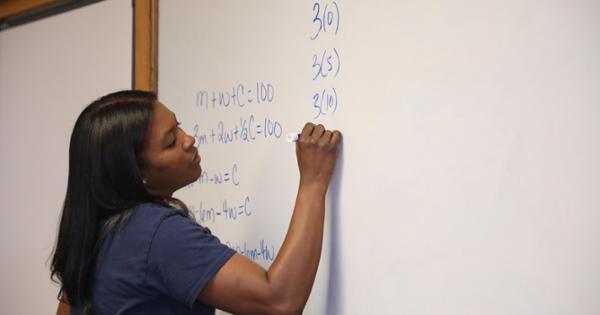JOHNSON CITY, Tenn. (March 7, 2022) – Math education major Tataya Johnson isn’t sure where she wants to eventually teach.
She does want to be wherever “the biggest need is.”
“I want to help those who need it most because I was once the young girl from an inner
city who did not have access to support systems that every child needs to be successful,”
said Johnson, a junior at East Tennessee State University.
Professors in ETSU’s Mathematics and Statistics Department are preparing students like Johnson to enter a workforce that desperately needs more
teachers, especially in math.

“With a major in math education, you are just about guaranteed a position once you
pass all the requirements. You can be assured that there will be several school systems
in our area or elsewhere who will be glad to have you as part of their faculty,” said
Dr. Daryl L. Stephens, associate professor, associate chair and the math education
major adviser. “We get more inquiries from school systems seeking to hire someone
than we have graduates, which is unfortunate for the school systems but good for our
graduates.”
The ability to get a job is appealing. So is the potential to be a great influence.
“With a major in math education, you have an opportunity to influence countless youth
on their way to becoming competent, well-rounded adults who are numerate as well as
literate,” said Stephens, who taught math in public schools before joining ETSU. “With
any luck, you can pass along an enthusiasm for the structure, beauty and utility of
mathematics to the next several generations, and help stamp out math anxiety and math
phobia.”
At ETSU, students who ultimately want to teach math have access to a range of resources
and curriculum.
The courses offered by the department give a good perspective on the math foundation
courses taught in schools. All students take part in an original research project,
presenting it to their peers and professors. For students who opt for a secondary
education minor, they get the chance to work with a veteran teacher in a public school
for nearly an entire academic year, earning in-depth, on-the-ground experience.
“Some students prefer not to do the secondary education minor and then go on to get
a Master of Arts in Teaching degree, in which case they get all of their education
training in graduate courses,” said Stephens. “Either way, they get the exact same
undergraduate math background.”
Though many Americans were likely aware of teacher shortages before the pandemic,
COVID-19 has made an already difficult issue worse, the National Education Association reported.
“For more than 100 years, ETSU has been meeting a critical need of providing educators
for classrooms in this region and beyond,” said Dr. Kimberly D. McCorkle, ETSU provost
and senior vice president for Academics. “I commend our faculty for the work they
are doing to train and prepare future math educators who will inspire a love for math
in their students.”
Future teachers like Johnson want to help.
“I had amazing teachers in high school who took time out to make sure that I knew
that they could see me and hear my cry,” she said. “They gave me the push needed to
continue, and nothing would be more fulfilling than me becoming that person for others.”
For questions about majoring in math education, contact Stephens at stephen@etsu.edu or (423) 439-6981.
 Stout Drive Road Closure
Stout Drive Road Closure